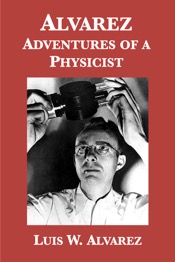 $9.99 on Kindle
$9.99 on KindleAlvarez: Adventures of a Physicist by Luis W. Alvarez (116,000 words and 17 photographs; this edition is published by arrangement with Basic Books, an imprint of Perseus Books, LLC, a subsidiary of Hachette Book Group, Inc.)
During World War II, Luis W. Alvarez participated in the Allies’ development of radar at the MIT Radiation Laboratory, and of the atomic bomb at Los Alamos. He then worked as an experimental physicist on cyclotrons, particle accelerators and bubble chambers at UC-Berkeley with Ernest Lawrence. Later in life, he used cosmic rays to “X ray” an Egyptian pyramid, developed a new theory about the extinction of the dinosaurs, and won the 1968 Nobel prize in physics for his work on elementary particles.
In this autobiography, Alvarez shares insights on the process of scientific discovery, risk-taking in science and how theoretical and experimental physics interact.
“[A] delightful autobiography... [A] fascinating book... It should be read by everyone who is interested in science and adventure, or who just wants to meet one of our most fascinating contemporaries.” — James Trefil, New York Times Book Review
“Beyond its self-portrait, Alvarez provides an exceptionally clear view of the world of science.” — Alan Lightman, Washington Post Book World
“This is a richly absorbing autobiography... Personally as well as scientifically forthright and plainspoken, [Alvarez] holds the reader with the story of his life as a scientist, much of the time at Berkeley, Calif., working with such men as Robert Oppenheimer, Ernest Lawrence and Enrico Fermi.” — Publishers Weekly
“A gripping book. It succeeds well in making the scientific experience and the excitement of discovery accessible to the general reader.” — Richard L. Garwin, Physics Today
“A fascinating life.” — Elena Brunet, Los Angeles Times
“One of the best popular books on science to emerge from the laboratory in years.” — Henry Kisor, Chicago Sun-Times
“Luis W. Alvarez has an unsurpassed reputation among scientists for a lifelong record of crucial participation in important discoveries in pure and applied science. In this book he performs an additional service by revealing his thought processes.” — Philip Abelson, Science Advisor, American Association for the Advancement of Science



